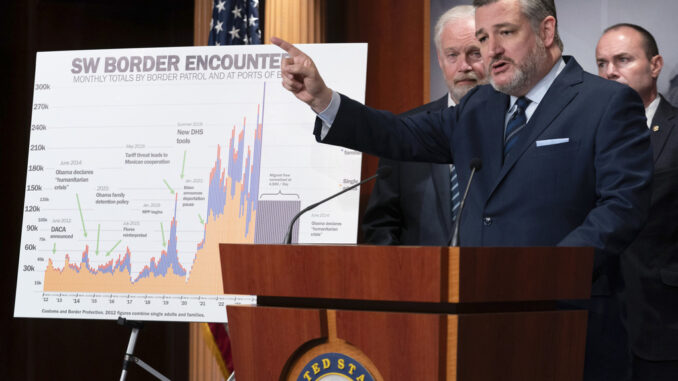

WASHINGTON, D.C. — Democrats hoping to hold their slim Senate majority after November are looking for upsets in two unlikely places, Texas and Florida, to help neutralize potential setbacks elsewhere.
But that means President Joe Biden’s party’s top opportunities to play political offense in Senate races are coming in America’s largest reliably red state and a onetime quintessential battleground that has moved decidedly to the right in recent years.
Still, with West Virginia Democratic Sen. Joe Manchin not seeking reelection, his seat is likely to flip Republican. Retaining their 51-49 Senate advantage likely means Democrats must defend their other 22 seats on the 2024 ballot — including party incumbents and independents who caucus with them — while also gaining seats, and they say Texas and Florida are their best shot.
Democrats nationwide have championed abortion rights and are looking to build on gains among suburban women and other key swing voters since the Supreme Court’s overturning of the Roe v. Wade decision in 2022. The party thinks many Texas and Florida voters are with them in believing Republicans have gone too far in restricting reproductive freedom.
In Florida, activists secured enough signatures to put on November’s ballot a referendum cementing access to abortion in the state constitution — following statewide votes defending abortion access in Republican-leaning Ohio and even more solidly red Kansas and Kentucky.
Democrats are also encouraged by Texas Republican Sen. Ted Cruz eking out reelection in 2018 by less than 3 percentage points over Democrat Beto O’Rourke. In Florida, meanwhile, Republican Sen. Rick Scott won his seat that year by around 10,000 votes out of 8.1-plus million cast.
“I think they are winnable states with the right Democratic candidate and the right Republican candidate,” said Michigan Sen. Gary Peters, chair of the Democratic Senatorial Campaign Committee. “And I think we’re going to have both.”
Running for Senate in Florida is Democratic former congresswoman Debbie Mucarsel-Powell, who upset two-term Republican Rep. Carlos Curbelo in 2018 but lost her seat representing parts of Miami in 2020. In Texas, Democratic Rep. Colin Allred of Dallas will have to overcome primary challenger Roland Gutierrez, a state senator from San Antonio, before he can take on Cruz.
Texas last voted Democratic for president in 1976. The party hasn’t won any of the 28 statewide offices there for 30 years. O’Rourke, after nearly toppling Cruz and unsuccessfully running for president in 2020, lost the 2022 governor’s race.
Florida voted twice for Donald Trump, and Republican Gov. Ron DeSantis romped to reelection in 2022, as did Republican Sen. Marco Rubio.
“Just ’cause they’re the best options they have doesn’t mean they’re winnable, doesn’t mean they’re competitive,” said Texas Republican strategist Matt Mackowiak.
Republicans only have to defend 10 seats and are looking to flip as many as eight held by Democrats, including West Virginia.
Montana Sen. Steve Daines, chair of the National Republican Senatorial Committee, the party’s campaign arm, said “the Democrats, we know, are going to dump millions of dollars (in) out-of-state money to buy those two seats” in Florida and Texas, but he believes Scott and Cruz are strong incumbents.
National Republicans are eying Ohio, where Democratic Sen. Sherrod Brown was first elected in 2006, and Montana’s Jon Tester, also a three-term Democratic incumbent. Both states are expected to vote Republican for president.
“This team is not over-confident,” Daines said. “We know we also have a great map, but you can’t fall in love with the map.”
He said strong candidates and messaging will make the difference, as well as a renewed push to encourage early voting and mail-balloting after Trump discouraged them in 2020.
The Democrats’ Senate campaign arm is including Texas and Florida in an investment worth at least $1 million on research and communications staffers across nine total states tasked with highlighting potential weaknesses of the GOP candidates.



